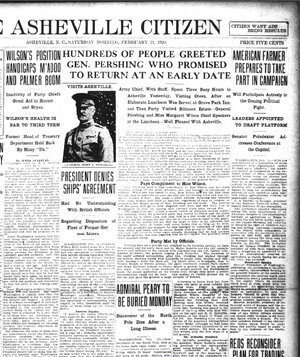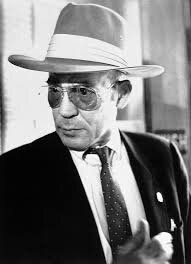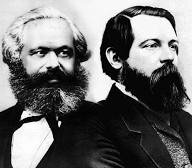I agree.Wish Twain was around these days.
Navigation
Install the app
How to install the app on iOS
Follow along with the video below to see how to install our site as a web app on your home screen.
Note: This feature may not be available in some browsers.
More options
You are using an out of date browser. It may not display this or other websites correctly.
You should upgrade or use an alternative browser.
You should upgrade or use an alternative browser.
This Date in History | Six Regulators Hanged
- Thread starter donbosco
- Start date
- Replies: 766
- Views: 15K
- Off-Topic
donbosco
Inconceivable Member
- Messages
- 3,367

#OTD (Feb. 20) in 1920 General ‘Black Jack’ Pershing arrived in Asheville. He was on a national tour as a triumphant military hero of World War 1 (not so much for his Mexican foray in 1916-1917, a failure by then long forgotten by the adoring public). No doubt Pershing was doing field work for a potential presidential bid. Warren Harding was the Republican winner later that year. Harding’s two years in office (he died) was scandal-ridden and gave us 10 years of Calvin Coolidge (his V.P.) — small government, hands-off policies — who in turn brought us The Great Depression. Despite a raucous reception - amidst the Pandemic quarantine - Pershing ultimately declined to run.
- Messages
- 1,102
For you weapon nuts out there
#OTD (Feb. 20) in 1920 General ‘Black Jack’ Pershing arrived in Asheville. He was on a national tour as a triumphant military hero of World War 1 (not so much for his Mexican foray in 1916-1917, a failure by then long forgotten by the adoring public). No doubt Pershing was doing field work for a potential presidential bid. Warren Harding was the Republican winner later that year. Harding’s two years in office (he died) was scandal-ridden and gave us 10 years of Calvin Coolidge (his V.P.) — small government, hands-off policies — who in turn brought us The Great Depression. Despite a raucous reception - amidst the Pandemic quarantine - Pershing ultimately declined to run.
M26 Pershing
The M26 was intended as a replacement of the M4 Sherman,[2] but a prolonged development period meant that only a small number saw combat in Europe. Based on the criteria of firepower, mobility, and protection, US historian R. P. Hunnicutt ranked the Pershing behind the German Tiger II heavy tank, but ahead of the Tiger I heavy and Panther medium tanks.[3] It was withdrawn in 1951 in favor of its improved derivative, the M46 Patton, which had a more powerful and reliable engine and advanced suspension.[4] The lineage of the M26 continued with the M47 Patton, and was reflected in the new designs of the later M48 Patton and M60 tank.[citation needed]

- Messages
- 1,102
Lotta good stuff today but I'm going with this because who in their right mind didn't like his writing and the whole gonzo thing.
American journalist and author Hunter S. Thompson—who created the genre known as gonzo journalism, a highly personal style of reporting that made him a counterculture icon—died of a self-inflicted gunshot wound.
Hunter S. Thompson (born July 18, 1937, Louisville, Kentucky, U.S.—died February 20, 2005, Woody Creek, Colorado) was an American journalist and author who created the genre known as gonzo journalism, a highly personal style of reporting that made Thompson a counterculture icon.
Thompson, who had a number of run-ins with the law as a young man, joined the U.S. Air Force in 1956. He served as a sports editor for a base newspaper and continued his journalism career after being discharged in 1957. In the following years he also wrote two autobiographical novels, but both were initially rejected by publishing houses; The Rum Diary eventually saw publication in 1998 (film 2011). In 1965 Thompson infiltrated the Hells Angels motorcycle gang, an experience he recounted in Hell’s Angels (1967). The book led to writing assignments for Esquire, Harper’s, Rolling Stone, and other magazines. In addition to his irreverent political and cultural criticism, Thompson also began to attract attention for his larger-than-life persona, which was highlighted by drug- and alcohol-fueled adventures and a distaste for authority.
In 1970 Thompson introduced his subjective style of reporting with the article “The Kentucky Derby Is Decadent and Depraved,” in which he was a central part of the story. A 1971 assignment for Sports Illustrated to cover a motorcycle race in Nevada resulted in perhaps his best-known work, Fear and Loathing in Las Vegas: A Savage Journey to the Heart of the American Dream, which became a contemporary classic and established the genre of gonzo journalism. First serialized in Rolling Stone in 1971, it documents the drug-addled road trip taken by Thompson (as his alter ego Raoul Duke) and his lawyer (Dr. Gonzo) while also discussing the end of the 1960s counterculture. The book featured frenetic artwork by Ralph Steadman, who illustrated many of Thompson’s works. Fear and Loathing in Las Vegas was adapted as a 1998 film directed by Terry Gilliam and starring Johnny Depp and Benicio Del Toro.
Similar to Kerouac’s On the Road, Hunter S. Thompson’s novel Fear and Loathing in Las Vegas is autobiographical in nature. The story is based on two trips to Las Vegas taken by Thompson and his attorney, Oscar Zeta Acosta, in an attempt to gather information for articles commissioned by Sports Illustrated and Rolling Stone. Protagonist Raoul Duke, Thompson’s literary double, goes to Las Vegas with attorney Dr. Gonzo, Acosta’s fictional counterpart. While there, Duke and Dr. Gonzo are meant to report on the Mint 400 motorcycle race, but they are constantly interrupted by their intensive use of recreational drugs including LSD, cocaine, cannabis, and alcohol. During bouts of hallucinogenic experiences, the two ponder the meaning of the “American Dream” and the counterculture.
Thompson’s recounting of the past in a manner than blends both fact and fiction gave rise to the genre of gonzo journalism, an inherently countercultural method of reporting.

American journalist and author Hunter S. Thompson—who created the genre known as gonzo journalism, a highly personal style of reporting that made him a counterculture icon—died of a self-inflicted gunshot wound.
Hunter S. Thompson (born July 18, 1937, Louisville, Kentucky, U.S.—died February 20, 2005, Woody Creek, Colorado) was an American journalist and author who created the genre known as gonzo journalism, a highly personal style of reporting that made Thompson a counterculture icon.
Thompson, who had a number of run-ins with the law as a young man, joined the U.S. Air Force in 1956. He served as a sports editor for a base newspaper and continued his journalism career after being discharged in 1957. In the following years he also wrote two autobiographical novels, but both were initially rejected by publishing houses; The Rum Diary eventually saw publication in 1998 (film 2011). In 1965 Thompson infiltrated the Hells Angels motorcycle gang, an experience he recounted in Hell’s Angels (1967). The book led to writing assignments for Esquire, Harper’s, Rolling Stone, and other magazines. In addition to his irreverent political and cultural criticism, Thompson also began to attract attention for his larger-than-life persona, which was highlighted by drug- and alcohol-fueled adventures and a distaste for authority.
In 1970 Thompson introduced his subjective style of reporting with the article “The Kentucky Derby Is Decadent and Depraved,” in which he was a central part of the story. A 1971 assignment for Sports Illustrated to cover a motorcycle race in Nevada resulted in perhaps his best-known work, Fear and Loathing in Las Vegas: A Savage Journey to the Heart of the American Dream, which became a contemporary classic and established the genre of gonzo journalism. First serialized in Rolling Stone in 1971, it documents the drug-addled road trip taken by Thompson (as his alter ego Raoul Duke) and his lawyer (Dr. Gonzo) while also discussing the end of the 1960s counterculture. The book featured frenetic artwork by Ralph Steadman, who illustrated many of Thompson’s works. Fear and Loathing in Las Vegas was adapted as a 1998 film directed by Terry Gilliam and starring Johnny Depp and Benicio Del Toro.
Similar to Kerouac’s On the Road, Hunter S. Thompson’s novel Fear and Loathing in Las Vegas is autobiographical in nature. The story is based on two trips to Las Vegas taken by Thompson and his attorney, Oscar Zeta Acosta, in an attempt to gather information for articles commissioned by Sports Illustrated and Rolling Stone. Protagonist Raoul Duke, Thompson’s literary double, goes to Las Vegas with attorney Dr. Gonzo, Acosta’s fictional counterpart. While there, Duke and Dr. Gonzo are meant to report on the Mint 400 motorcycle race, but they are constantly interrupted by their intensive use of recreational drugs including LSD, cocaine, cannabis, and alcohol. During bouts of hallucinogenic experiences, the two ponder the meaning of the “American Dream” and the counterculture.
Thompson’s recounting of the past in a manner than blends both fact and fiction gave rise to the genre of gonzo journalism, an inherently countercultural method of reporting.

nashcounty
Distinguished Member
- Messages
- 304
- Messages
- 1,102
It was between him or Thompson. Not just the talent but a huge figure in the conservation movement.
donbosco
Inconceivable Member
- Messages
- 3,367

Did you ever wonder? The motto has always struck me as a good bit of prideful humility — NC is, after all, a paradox of a place. Well, #OTD (Feb. 21) in 1893 the N.C. General Assembly adopted ‘Esse Quam Videri’ (To Be, Rather Than To Seem) as the state motto. The phrase has associations with Cicero (de Amnicitia), Aeschylus, Socrates, and in modern times Albert Camus.
The phrase was chosen by that 1893 General Assembly as one “expressive of some noble sentiment and indicative of some leading trait of our people.” The 1890s saw the rise of the Populist Party in North Carolina and that 1893 congress, dominated by conservative Democrats must have been aware of the growing dissatisfaction in the outlands. The Farmers Alliance was a major — really THE major factor — in that movement to reform finance, transportation, and education, wrestling control of all three from the state’s, and the region’s, historic elites. The Populist’s national goal, outlined in its Omaha Platform, went so far as to call for government ownership of railroads.
The 1892 election had resulted in the Democrat, Elias Carr only taking 48% of the vote. Carr was a reluctant populist of sorts, a former leader of the Farmers Alliance, but an advocate of stronger railroad regulation rather than the seizure of ownership by the state. Despite his relatively conservative stance, it must have been clear that radical ideas were gaining in The Old North State and perhaps farther afield.
Indeed, an alliance of Populists (young, disgruntled one-time Democrats) and Republicans (the party of African Americans in those days in The South) did take control of the NC General Assembly in 1894. This was termed as ‘Fusion’ and held great promise for Progressive policies. This Fusion would even take the office of Governor in 1896. Outrageously NC conservatives would mount a White Supremacist campaign in 1898 and retake the reins of government, install Jim Crow, and suppress the African American vote until the 1964 Voting Rights Act began the still ongoing effort to re-enfranchise voters.
But back to 1893…remembering this backdrop of challenge of the status quo by Populists, farmers mainly, from The Left, I have long wondered about the choice of “To Be Rather Than To Seem” as a motto. The phrase seems hardly the kind that a traditional ruling class such as still maintained control of the General Assembly in 1893 would promote. It is…well…too human, even humane. Did some radical thinking slip into the Sanctum Santorum of that conservative plurality in the General Assembly still hanging on in 1893 and infuse those legislators with, at least briefly, a sense of humility such as would have given them pause to choose such a humble, even self-effacing, motto as “Esse Quam Videri?” Or should I imagine the phrase as rather a bone tossed to the masses in a time when the state’s traditional elite were casting about anywhere for painless ways to pacify a populace on the rise? Perhaps I’ve overthought it - only more digging will probe one way or the other. At any rate, it IS my second favorite humble brag — after “A Vale of Humility Between Two Mountains of Conceit” of course.
Classical Origins of the State’s Motto Kudos to @ncpedia for the research into the original texts. State Motto of North Carolina: Esse Quam Videri
- Messages
- 1,102
For @SnoopRob fir calling out us commies on the hockey thread.
On this day, the Communist Manifesto, written by Karl Marx and Friedrich Engels, was first published; the pamphlet became hugely influential.
The Communist Manifesto, (“Manifesto of the Communist Party”), pamphlet (1848) written by Karl Marx and Friedrich Engels to serve as the platform of the Communist League. It became one of the principal programmatic statements of the Europeansocialist and communist parties in the 19th and early 20th centuries.
The Communist Manifesto embodies the authors’ materialistic conception of history (“The history of all hitherto existing society is the history of class struggles”), and it surveys that history from the age of feudalism down to 19th-century capitalism, which was destined, they declared, to be overthrown and replaced by a workers’ society. The communists, the vanguard of the working class, constituted the section of society that would accomplish the “abolition of private property” and “raise the proletariat to the position of ruling class.”
The Communist Manifesto opens with the dramatic words “A spectre is haunting Europe—the spectre of communism” and ends by stating, “The proletarians have nothing to lose but their chains. They have a world to win. Workingmen of all countries, unite.”

These guys went on to live interesting lives as well.
On this day, the Communist Manifesto, written by Karl Marx and Friedrich Engels, was first published; the pamphlet became hugely influential.
The Communist Manifesto, (“Manifesto of the Communist Party”), pamphlet (1848) written by Karl Marx and Friedrich Engels to serve as the platform of the Communist League. It became one of the principal programmatic statements of the Europeansocialist and communist parties in the 19th and early 20th centuries.
The Communist Manifesto embodies the authors’ materialistic conception of history (“The history of all hitherto existing society is the history of class struggles”), and it surveys that history from the age of feudalism down to 19th-century capitalism, which was destined, they declared, to be overthrown and replaced by a workers’ society. The communists, the vanguard of the working class, constituted the section of society that would accomplish the “abolition of private property” and “raise the proletariat to the position of ruling class.”
The Communist Manifesto opens with the dramatic words “A spectre is haunting Europe—the spectre of communism” and ends by stating, “The proletarians have nothing to lose but their chains. They have a world to win. Workingmen of all countries, unite.”

These guys went on to live interesting lives as well.
Last edited:
donbosco
Inconceivable Member
- Messages
- 3,367
For @SnoopRob fir calling out us commies on the hockey thread.
The Communist Manifesto, (“Manifesto of the Communist Party”), pamphlet (1848) written by Karl Marx and Friedrich Engels to serve as the platform of the Communist League. It became one of the principal programmatic statements of the Europeansocialist and communist parties in the 19th and early 20th centuries.
The Communist Manifesto embodies the authors’ materialistic conception of history (“The history of all hitherto existing society is the history of class struggles”), and it surveys that history from the age of feudalism down to 19th-century capitalism, which was destined, they declared, to be overthrown and replaced by a workers’ society. The communists, the vanguard of the working class, constituted the section of society that would accomplish the “abolition of private property” and “raise the proletariat to the position of ruling class.”
The Communist Manifesto opens with the dramatic words “A spectre is haunting Europe—the spectre of communism” and ends by stating, “The proletarians have nothing to lose but their chains. They have a world to win. Workingmen of all countries, unite.”
These guys went on to live interesting lives as well.
Hmmmm. Did something happen #OTD in relation to The Communist Manifesto?
- Messages
- 1,102
FIFY. Damn you academics with critical reading skills.Hmmmm. Did something happen #OTD in relation to The Communist Manifesto?
On this day, The Communist Manifesto, written by Karl Marx and Friedrich Engels, was first published; the pamphlet became hugely influential.
Paine
Iconic Member
- Messages
- 2,110
The specter is still here and haunting capitalists.For @SnoopRob fir calling out us commies on the hockey thread.
On this day, the Communist Manifesto, written by Karl Marx and Friedrich Engels, was first published; the pamphlet became hugely influential.
The Communist Manifesto, (“Manifesto of the Communist Party”), pamphlet (1848) written by Karl Marx and Friedrich Engels to serve as the platform of the Communist League. It became one of the principal programmatic statements of the Europeansocialist and communist parties in the 19th and early 20th centuries.
The Communist Manifesto embodies the authors’ materialistic conception of history (“The history of all hitherto existing society is the history of class struggles”), and it surveys that history from the age of feudalism down to 19th-century capitalism, which was destined, they declared, to be overthrown and replaced by a workers’ society. The communists, the vanguard of the working class, constituted the section of society that would accomplish the “abolition of private property” and “raise the proletariat to the position of ruling class.”
The Communist Manifesto opens with the dramatic words “A spectre is haunting Europe—the spectre of communism” and ends by stating, “The proletarians have nothing to lose but their chains. They have a world to win. Workingmen of all countries, unite.”
These guys went on to live interesting lives as well.
My personal favorite section from the manifesto:
“The bourgeoisie cannot exist without constantly revolutionizing the instruments of production, and thereby the relations of production, and with them the whole relations of society. Conservation of the old modes of production in unaltered forms, was, on the contrary, the first condition of existence for all earlier industrial classes. Constant revolutionizing of production, uninterrupted disturbance of all social conditions, everlasting uncertainty and agitation, distinguish the bourgeois epoch from all earlier ones. All fixed, fast-frozen relations, with their train of ancient and venerable prejudices and opinions, are swept away; all new-formed ones become antiquated before they can ossify. All that is solid melts into air, all that is holy is profaned, and man is at last compelled to face with sober senses his real conditions of life and his relations with his kind.”
Anyone that thinks this text isn’t relevant today has their head in the sand. No other text has been more helpful in grounding my thinking. I can understand how liberals feel quite adrift right now, but Marx offers explanations for everything that we’ve seen happen since 2008.
Last edited:
donbosco
Inconceivable Member
- Messages
- 3,367
Might I recommend this film?
BTW, I'm much more of a fan of The Philosophical and Economic Manuscripts of 1844...a much more vulgar and romantic (in the classical sense) Marx.
“The less you eat, drink and read books...the less you think, love, theorize, sing, paint, fence, etc., the more you save - the greater becomes your treasure which neither moths nor dust will devour - your capital. The less you are, the more you have.”
Short and to the point.
BTW, I'm much more of a fan of The Philosophical and Economic Manuscripts of 1844...a much more vulgar and romantic (in the classical sense) Marx.
“The less you eat, drink and read books...the less you think, love, theorize, sing, paint, fence, etc., the more you save - the greater becomes your treasure which neither moths nor dust will devour - your capital. The less you are, the more you have.”
Short and to the point.
Marx's Economic and Philosophic Manuscripts of 1844
Preface and Table of Contents for Marx's Economic and Philosophic Manuscripts of 1844
www.marxists.org
Paine
Iconic Member
- Messages
- 2,110
Might I recommend this film?
BTW, I'm much more of a fan of The Philosophical and Economic Manuscripts of 1844...a much more vulgar and romantic (in the classical sense) Marx.
“The less you eat, drink and read books...the less you think, love, theorize, sing, paint, fence, etc., the more you save - the greater becomes your treasure which neither moths nor dust will devour - your capital. The less you are, the more you have.”
Short and to the point.
Marx's Economic and Philosophic Manuscripts of 1844
Preface and Table of Contents for Marx's Economic and Philosophic Manuscripts of 1844www.marxists.org
I’ll have to give that a watch. Right now I’m reading “Citizen Marx” by Bruno Leipold.
Description: “The first book to offer a comprehensive exploration of Marx’s relationship to republicanism, arguing that it is essential to understanding his thought”
Really interesting read so far. Helpful for reclaiming communism and socialism from the red terror of the USSR. This will have to be a major project of the left over the next century if we want a better world.
donbosco
Inconceivable Member
- Messages
- 3,367
Missed this by a couple of days (and technically one year). I don't know how many people actually know about this blog (which is on hiatus at present) dedicated to the photography of Hugh Morton.
Hugh Morton’s 103rd – A View to Hugh
Who was Hugh Morton anyway? He was definitely for a good deal of his life kind of the UNC Forrest Gump with a camera.
Here's a Biography: Hugh Morton - Grandfather Mountain Founder
Hugh Morton’s 103rd – A View to Hugh
Who was Hugh Morton anyway? He was definitely for a good deal of his life kind of the UNC Forrest Gump with a camera.
Here's a Biography: Hugh Morton - Grandfather Mountain Founder
- Messages
- 1,102
A relatively rare wealthy individual who did well for society in general, the state of NC, and last but not least, UNC. This, with his own unique photographic abilities.Missed this by a couple of days (and technically one year). I don't know how many people actually know about this blog (which is on hiatus at present) dedicated to the photography of Hugh Morton.
Hugh Morton’s 103rd – A View to Hugh
Who was Hugh Morton anyway? He was definitely for a good deal of his life kind of the UNC Forrest Gump with a camera.
Here's a Biography: Hugh Morton - Grandfather Mountain Founder
donbosco
Inconceivable Member
- Messages
- 3,367
A relatively rare wealthy individual who did well for society in general, the state of NC, and last but not least, UNC. This, with his own unique photographic abilities.
Grandpa Hugh MacRae was born in Chatham County (very #DeepestChatham) and was a gadfly of Tar Heel business projects and ideas. He was, unfortunately, very involved in the Coup d'etat side of the Wilmington Massacre of 1898.
"In 1898, he was a leader in the conspiracy to overthrow the legitimate elected Black-white fusionist leadership of Wilmington, North Carolina. MacRae organized the white supremacist mob and campaign that kept Black voters from the polls during the 1898 election and then led a vigilante group, along with Alfred Waddell, that took to the streets in Wilmington to murder Black citizens the next day. The ensuing violence and slaughter that took place in the city has become known as the Wilmington Coup. Members of the white supremacist group, led by Alfred Waddell, later wrote, and implemented a white supremacist manifesto, a set of resolutions called the 'White Declaration of Independence.'"
MacRae, Hugh
Share:

